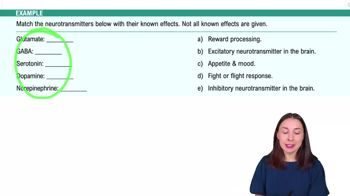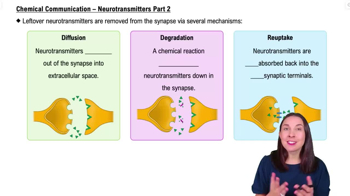Table of contents
- 1. Introduction to Psychology1h 43m
- 2. Psychology Research2h 20m
- 3. Biological Psychology2h 41m
- 4. Sensation and Perception28m
- 5. Consciousness and Sleep32m
- 6. Learning41m
- 7. Memory34m
- 8. Cognition37m
- 9. Emotion and Motivation35m
- 10. Developmental Psychology33m
- 11. Personality48m
- 12. Social Psychology41m
- 13. Stress and Health41m
- 14. Psychological Disorders44m
- 15. Treatment47m
3. Biological Psychology
Communication in the Nervous System
Struggling with Psychology?
Join thousands of students who trust us to help them ace their exams!Watch the first videoMultiple Choice
_____ is the release of a neural impulse, consisting of a reversal of the electrical charge within the axon.
A
Diffusion
B
Resting potential
C
Trickle charge
D
Action potential
 Verified step by step guidance
Verified step by step guidance1
Understand the context: The problem is asking about a specific process related to neural impulses and electrical charges within an axon.
Identify key terms: The term 'release of a neural impulse' suggests a process that involves a change in electrical charge.
Recall relevant concepts: In neuroscience, the 'action potential' is the process where there is a reversal of electrical charge across the axon membrane, leading to the transmission of a neural impulse.
Differentiate from other options: 'Diffusion' refers to the movement of particles from an area of high concentration to low concentration, 'resting potential' is the state of the neuron when not firing a neural impulse, and 'trickle charge' is not a relevant term in this context.
Conclude with the correct concept: Based on the understanding of these terms, the correct answer is 'Action potential', as it describes the reversal of electrical charge within the axon during the release of a neural impulse.

 1:20m
1:20mWatch next
Master Electrochemical Communication with a bite sized video explanation from Hannah Gordils
Start learningRelated Videos
Related Practice
































